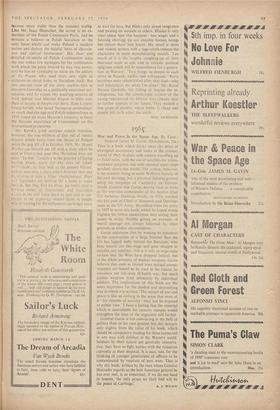War and Peace, in the Space Age. By Lieut.-
General James M. Gavin. (Hutchinson, 21s.) Tuts is a book which blows away the mists of strategical uncertainty and looks at the military world of 1965. It deals with rockets travelling up to 5,000 miles, with the use of satellites for recon- naissance purposes and with manned space ships perched above the world. The author, however, is no scientist living in some Wellsian fantasy of his own devising, but a practical fighting'general using the language of Camberley or Leaven- worth. General Jim Gavin, having risen to fame as the war-time commander of the famous 82nd US Airborne Division, finally, in 1954, reached the key post of Chief of Research and Develop- ment in the.US Army. He. retired from the army in 1957 to write this book, which he hoped would frighten his fellow countrymen into setting their house in order, thereby giving an example of moral courage not . always followed by other generals in similar circumstances.
Gavin maintains that by wasting its resources in the construction of a large bomber fleet the US has lagged sadly behind the Russians, who have missed out this stage and gone straight to missiles and satellites. Nor is it only in large-scale rockets that the West have dropped behind, but in the whole armoury of nuclear weapons. Gavin believes that even in limited wars tactical atomic weapons are bound to be used in the future; he visualises not full-scale H-bomb war, but small atomic weapons fired ultimately by individual soldiers. The implications of this book are the more impressive for the modest and unassuming way in which it is written. 'The subject of war and peace is like an iceberg in the sense that most of it—for reasons of security—may not be exposed to public view.' I have a feeling that the material which is unavailable for security reasons would strengthen the lines of the argument still further.
General Gavin is less convincing in the field of politics than on his own ground, but this detracts only slightly from the value of his book, which should be compulsory reading for those connected in any way with defdnce in the Western ■\ edit. Soldiers by their nature are generally conserva- tive; they have to fight battles with the resources currently at their disposal. It is easy, too, for the thinking of younger generations of officers to be contaminated by veterans of past wars. That is why this book, written by the man whom General Horrocks regards as the best American general he has ever met, is so important; if we do not heed its lessons, 'the only peace we shall find will be the peace of Carthage.'
A. J. WILSON


































 Previous page
Previous page